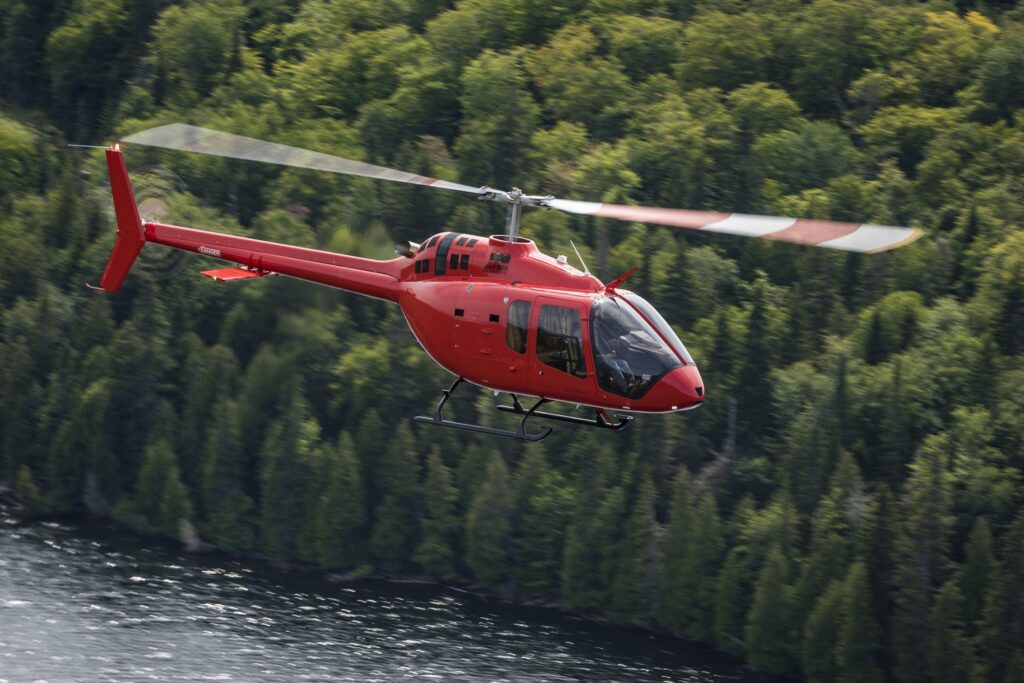
Safran Helicopter Engines and Bell Textron have agreed to partner in researching the performance of sustainable aviation fuel (SAF) in an Arrius 2R to operate the Bell 505 helicopter, and the collaborators will also analyze the economic impacts of SAF use. (Photo: Bell)
DALLAS, TEXAS — During a 2022 HAI Heli-Expo press briefing, Safran Helicopter Engines and Bell Textron Inc. announced that they will collaborate in studying the technical performance and economic impacts of sustainable aviation fuel (SAF) using the Bell 505 helicopter, powered by the Arrius 2R engine. Reducing carbon emissions is a top priority for Safran, and the company’s Helicopter Engines division has set a goal of using SAF to make up to 50% of all aviation fuel usage by 2025.
At the press conference given by Safran Helicopter Engines, CEO Franck Saudo remarked that SAF is “the most efficient and pragmatic [way] to achieve decarbonization,” said Saudo. Any helicopter engine can use a blend of up to 50% SAF, and the team at Safran Helicopter Engines is working to enable use of 100% SAF as soon as possible.

The Aneto enables increased mission capabilities by delivering 25% more thermal power.
SAF is just one part of Safran’s decarbonization strategy. Some of the latest developments have been reductions in fuel consumption. During the press conference, Saudo highlighted the Arrano engine, which powers the Airbus H160, that features a 15% reduction in fuel consumption. The design of the Arrano includes “a new-generation digital control system that offers greater in-flight responsiveness, enhancing both safety and pilot handling,” according to Safran. It also offers a significant reduction in engine maintenance compared to existing engines.
The family of engines called Aneto was another focal point of the presentation; the Aneto engines are designed for super-medium and heavy helicopters and deliver 25% more thermal power compared to similar existing engines. Both Aneto and Arrano engines were on display at Safran’s booth at Heli-Expo.

The Arrano engine powers Airbus 160 helicopters and was certified by the FAA in 2020. It is capable of reducing fuel consumption by 10–15%.
2021 was a low point for Safran Helicopter Engines in terms of engine production, according to Saudo, but the market recovery has already begun. “Some market segments have dramatically bounced back, such as the light helicopters market,” Saudo said. “What we see going forward for Safran Helicopter Engines is a significant ramp-up in 2022 with over 15% increase in engine production compared to 2021.” The Helicopter Engines division is also planning to hire more than 250 employees worldwide over the next year.
In response to a question about increasing SAF usage, Saudo explained that although there is a limited supply of SAF, it is difficult to increase production of it unless there is demand. Similarly, it is a challenge to grow demand for SAF without sufficient production. “We need to convince all market players that SAF is the most pragmatic and fast way to get to decarbonization. Safran is doing work with oil producers to see how facilities can produce SAF in sufficient quantities at a cost on par with conventional fuel.”
Doug May, Vice President of Customer Experience at Bell, remarked on the collaborative initiative with Safran, saying, “We look forward to gaining a comprehensive understanding of SAF incorporation that will inform future aircraft technology and operations and ultimately support greener aviation practices.”